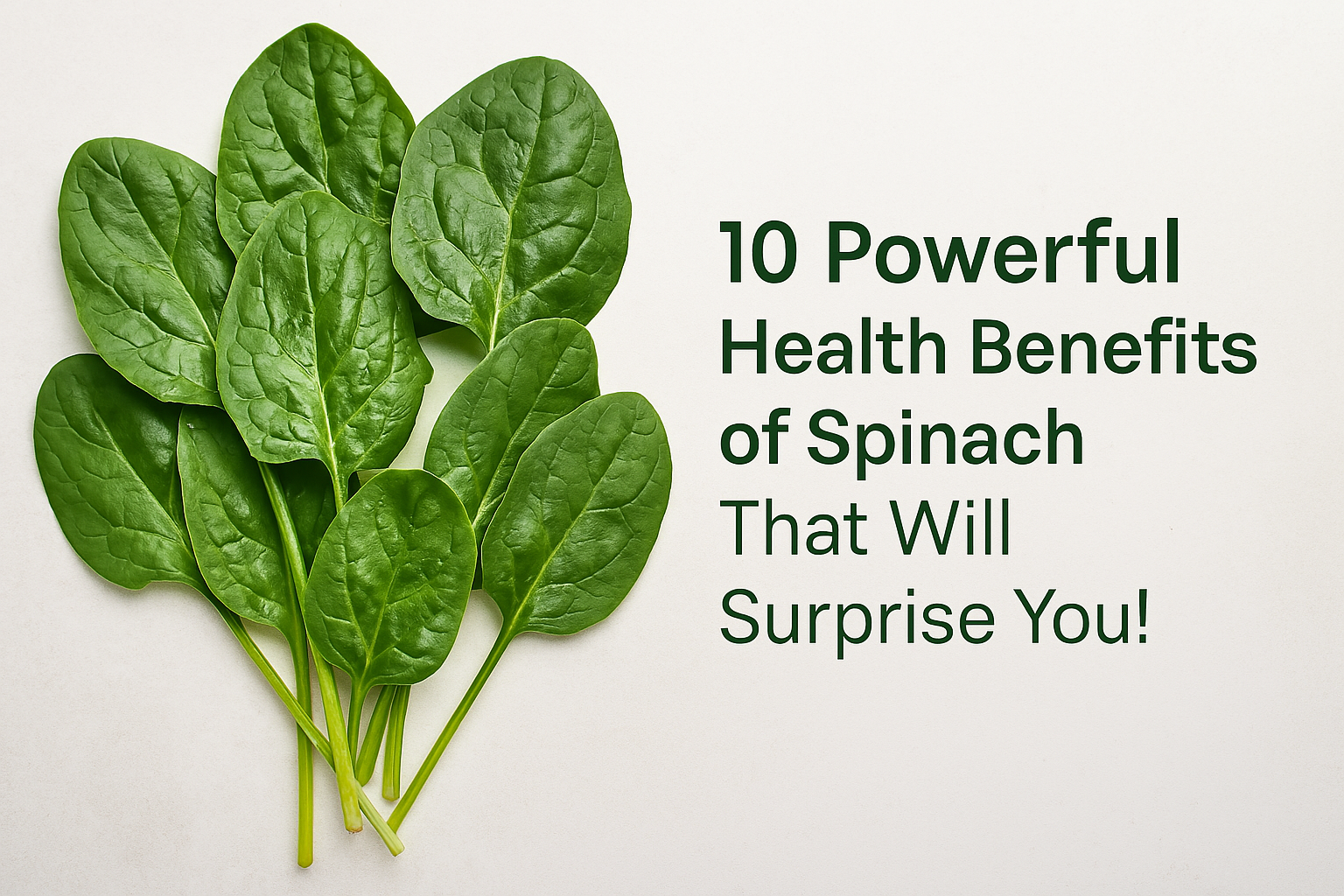When it comes to boosting your diet with nutritious foods, leafy greens are essential—and spinach leads the way. The health benefits of spinach are incredibly diverse, supporting nearly every part of your body. As a nutrient-rich superfood, spinach is low in calories yet loaded with vitamins, minerals, and antioxidants that can improve your health from head to toe.
Nutrition facts
The nutrition facts for 3.5 ounces (100 grams) of raw spinach are: (1)
Calories: 23
Water: 91%
Protein: 2.9 grams
Carbs: 3.6 grams
Sugar: 0.4 grams
Fiber: 2.2 grams
Fat: 0.4 grams
Whether eaten raw, cooked, or blended, spinach is a simple yet powerful addition to your daily meals. Let’s dive into the top 10 health benefits of spinach that you’ll wish you knew sooner!
1. Health Benefits of Spinach for Eye Protection
One of the key health benefits of spinach is its role in supporting eye health. Rich in lutein and zeaxanthin—two plant-based antioxidants—spinach protects your eyes from harmful UV light and may help prevent age-related vision problems such as cataracts and macular degeneration. These compounds are especially beneficial for those who spend long hours in front of screens or under artificial lighting.
2. A Nutrient-Rich Superfood That Strengthens Immunity
Spinach is a nutrient-rich superfood packed with immune-boosting vitamins like A, C, and E. These antioxidants help your body defend against infections, reduce inflammation, and speed up healing. During cold and flu seasons, regular spinach consumption can strengthen your natural defense system and promote faster recovery from illness.
3. Spinach Supports Healthy Bones and Joints
One of the lesser-known health benefits of spinach is its bone-building power. It’s a top source of vitamin K1, which helps the body absorb calcium and maintain bone density. Magnesium and phosphorus in spinach also play a vital role in keeping your bones and joints strong, reducing the risk of fractures and joint pain as you age.
4. A Natural Way to Boost Iron Levels
Iron is essential for producing healthy red blood cells, and spinach is an excellent plant-based source. Though it contains non-heme iron (not absorbed as easily as animal sources), pairing spinach with vitamin C-rich foods (like lemon or orange juice) improves absorption. This nutrient-rich superfood is perfect for preventing fatigue, especially in women, athletes, and vegetarians.
5. Lowers Blood Pressure Naturally
One of the standout health benefits of spinach is its ability to reduce high blood pressure. Thanks to its rich nitrate content, spinach helps dilate blood vessels and improve blood circulation. Studies have shown that consuming leafy greens like spinach can lead to noticeable improvements in heart health, and lower your risk of stroke or heart attacks.
6. Improves Skin Health and Natural Glow
Spinach is high in vitamin A, which supports skin cell turnover and keeps your skin soft and hydrated. It also contains antioxidants that fight free radicals and delay signs of aging like wrinkles, dullness, and dark spots. For glowing, blemish-free skin, adding this nutrient-rich superfood to your meals can make a visible difference in just weeks.
7. Promotes Hair Growth and Scalp Health
Want stronger, shinier hair? Spinach can help! The iron and folate in spinach improve oxygen supply to hair follicles, while vitamins B and C stimulate healthy hair growth. The health benefits of spinach also include reducing hair fall caused by nutritional deficiencies and strengthening roots from within.
8. Aids in Digestion and Gut Health
Spinach is high in fiber—both soluble and insoluble—which supports healthy digestion. It helps keep bowel movements regular, reduces bloating, and promotes gut bacteria balance. The fiber content makes it a gentle natural remedy for constipation and supports long-term digestive wellness.
Additionally, spinach’s anti-inflammatory properties soothe the digestive tract and may ease symptoms of conditions like irritable bowel syndrome (IBS).
9. Reduces Inflammation in the Body
Thanks to its abundance of antioxidants, spinach helps fight chronic inflammation, which is linked to various conditions like arthritis, heart disease, and even cancer. This makes spinach not just a healthy food, but also a preventative one. By regularly consuming spinach, you can reduce inflammation at a cellular level and improve overall resilience.
10. Supports Brain Health and Mental Clarity
Last but not least, the health benefits of spinach extend to your brain. Spinach contains folate, vitamin K, and nitrates—all known to support cognitive function and slow down age-related mental decline. It also improves blood flow to the brain, boosting memory, focus, and mood. For students, professionals, or anyone under mental stress, spinach can be a brain-boosting ally.
Delicious Ways to Enjoy Spinach
Spinach is incredibly versatile and features in global cuisines both raw and cooked. Classic dishes include Spanakopita, a Greek pastry with spinach and feta; Palak Paneer, a creamy Indian curry with cottage cheese; and Creamed Spinach, a rich American steakhouse side. It also pairs beautifully with cheese in dishes like Spinach and Ricotta Ravioli.
For more inspiration, try a spinach and walnut salad with blue cheese dressing, chicken and spinach alfredo pasta, spinach pancakes, or baked eggs with spinach, tomatoes, and ricotta. Even smoothies benefit from a handful of spinach, adding nutrients without changing the taste (2).
Final Thoughts
Spinach has earned its reputation as a nutrient-rich superfood for all the right reasons. From your eyes to your bones, heart, skin, and brain—this humble green delivers impressive benefits. Easy to cook and versatile to use, it belongs in every healthy kitchen.
Whether it’s tossed into a salad, blended into a smoothie, cooked into a curry, or sautéed as a side, spinach offers more than just flavor—it offers lasting wellness. With so many amazing health benefits of spinach, it’s time to give this leafy green a permanent place on your plate.
For more informative food blogs visit Foodbook!
















